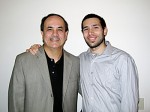Column Name
Title
Subhead
Father and son Behzad and Armand Ranjbaran share more than DNA. Both composers, they also share a vocation. Behzad (M.M. ’88, D.M.A. ’92, composition), a Juilliard faculty member since 1991, was born and raised in Iran. His music, which is rooted in 20th-century Romanticism, receives widespread attention with frequent performances around the country. Armand (B.M. ’11, composition) has recently had compositions performed by the Allentown (Pa.) and Peoria (Ill.) symphonies and also at Bargemusic. His current focus is on Operation Superpower, an educational, interactive opera that has an anti-bullying message aimed at kids; the project also received one of Juilliard’s first Jonathan Madrigano Entrepreneurship Grants earlier this year. Behzad and Armand recently chatted with ToniMarie Marchioni (MM ’07, DMA ’12, oboe).
Body
How did you feel when Armand said he’d decided to become a composer?
Behzad: It just happened. Early on when he was practicing the violin at age 5 or 6, I had devised a program for practice. We did scales and this and that. One part at the end was improvisation, which was his favorite part. From very early on, he looked forward to that free playing. Often, the melody of the piece that he was practicing—whether it was “Twinkle” or Minuet by Bach—would influence him, and he would play a variation around that melody unconsciously. We did that on a daily basis, and that’s probably one reason he was inclined to be interested in composing. I wasn’t planning that at all—I just thought every performer has to have the ability to improvise. It gives a sense of freedom from a very young age.
Armand: It’s interesting because I liked to create stuff when I was kid—whether it was drawing or the written word. Being at Juilliard was a huge part of this, just realizing that even though I like composing, I like doing other creative things just as much. It’s the creative process that I enjoy. I don’t know if I would have gotten into composition if my dad wasn’t a composer, but it was the perfect window to realizing I like being involved in creative processes.
Do you influence each other’s work?
Armand: Earlier on when I first started to compose, it was definitely more separate, and we did our own things. My dad is awesome about letting me be me and supporting me in everything I do. But as I’ve gotten older, we tend to “geek out.” We just say, “Oh, I’m doing this in my piece, I’m doing that in my piece.” It’s nice to be able to go to someone in the other room, when you’re isolated in composing, and just talk to them about the stuff you’re working on.
Behzad: We’re not so much influencing each other as exchanging ideas. We talk a lot about music, about the role of composer and the role of music in the society, what function it has. It’s an exchange of concepts and ideas of what composers we like, what music we don’t like. That’s the area that we often find time to speak about. I think the influence of music on someone’s work is very opaque because each composer is evolving. Each piece of music is a part of a long-range evolution. And sure, it is bound to have some kind of influence on the way you hear other composer’s works, but I think we really enjoy that exchange of ideas.
Armand: I call that geeking out.
Behzad, you’ve had huge success with big name soloists—Joshua Bell, Jean Yves-Thibaudet, Renée Fleming, and Yo-Yo Ma. What is it about your writing that attracts superstar musicians?
Behzad: I don’t know why they are attracted to it, but what I could say is that these are performers who like more melodic music rather than a very experimental, avant-garde style. Maybe my music has that melodic aspect as well as the virtuosity that becomes a vehicle to showcase their ability.
Would you ever do a project together?
Armand: I think it’s on the horizon.
What are your current projects?
Behzad: I’m writing two concertos now, one for flute and one for viola. They were commissions from the Philadelphia Orchestra and Jeffrey Khaner and for Paul Silverthorne, principal viola of the London Symphony. I’m doing a lot of solo writing.
Armand: The project that I’ve been working on for a few years now is Operation Superpower, a 45-minute, interactive superhero opera for kids. My collaborators are John Brancy and Tobias Greenhalgh, both baritones who are currently in the master’s program. We got a huge boost when we got the Madrigano grant and the project has been chugging along at a nice clip. We had a trial in Peoria and our latest performances have been in Rochester and on Long Island.
What’s Operation Superpower about?
Armand: Our main message is that everyone has a superpower—which is our word for talent. The example we give is that my superpower is composing, and John and Toby’s superpowers are that they sing. We’re just trying to spread the positivity and superhero goodness!
Behzad: I just love his project. It’s so inclusive, emphasizing collaboration among people rather than being number one, looking inward to find your own talent or superpower.
Armand: I love my dad.





